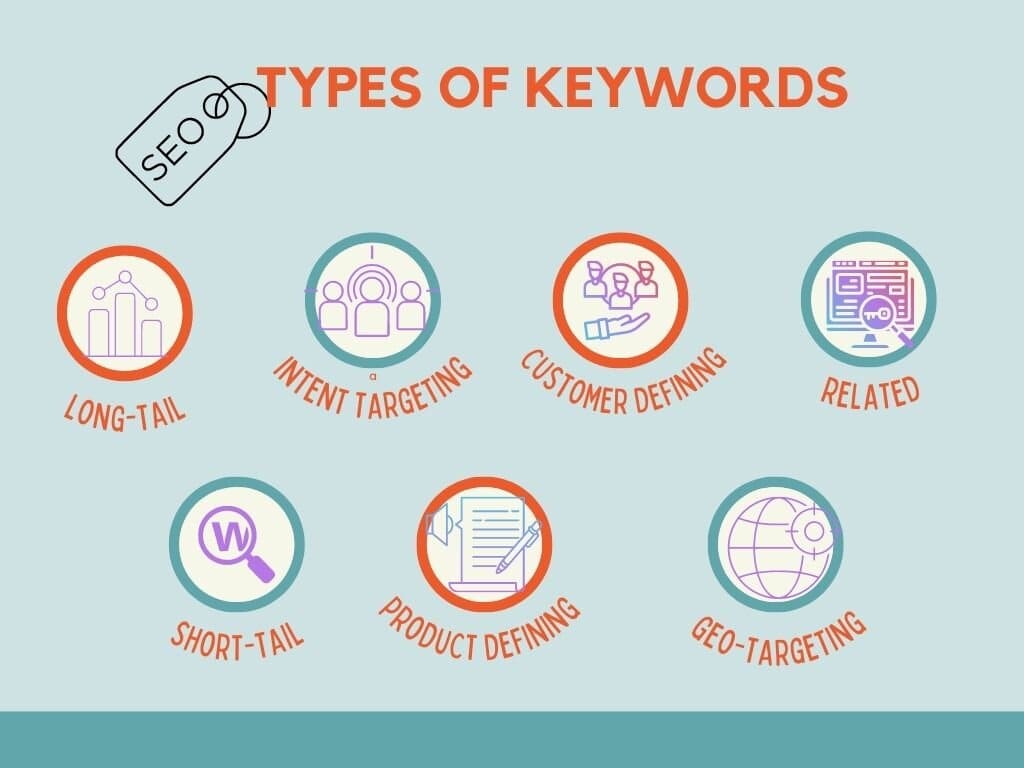

Be it the weather forecast or your favorite recipe, your go-to search engines address most of your queries. The medium through which we manage our queries is keywords. Therefore, it is essential to know your target audience and the keywords that the audience would supposedly use on the search engine to get better results than you dream of.
SEO keyword research is an essential step before you begin your SEO strategy and planning so that your digital marketing agency can aim for good search engine rankings for your website and app. To shoot up your business online, keyword research helps you with knowing the trend and ongoing competition in order to achieve organic visibility, rankings, and traffic. Before deep-diving into what keyword research means, let us look at what keywords are. In the world of digital marketing, keywords are terms that are typed in the search engine in order to gain knowledge about a particular topic. Moreover, what makes keywords an important part of SEO is that it helps lead the inquisitive searcher to land on the apt websites. The focus here is hence narrowed down to the searcher’s expectations.
- What is SEO Keyword Research?
- Benefits of SEO Keyword Research:
- Winning Potential audience
- A hike in conversion rates
- The consumer behavior
- Time management
- An improved organic ranking
- Types of SEO Keywords:
- Short tail keywords
- Long tail keywords
- Intent targeting keywords
- Product defining keywords
- Customer defining keywords
- Geo-targeting keywords
- Related keywords
- What is Competition Analysis
- Keyword Research Tools:
- Google Ads Keyword Planner
- Ubersuggest
- MOZ
What is SEO keyword research?
Keyword research is a method undertaken as an important part of SEO, where you hunt for trending keywords in order to incorporate them into your blogs, to gain a hike on Search Engine Result Pages (SERPs).
“Keyword research is never finished: repeating it regularly is essential to stay up-to-date!”
– Yoast SEO
The process of searching for the desired keywords for your content begins with choosing the topic that aims at a set of keywords you wish to rank for. It is important to research well in order to find all the possible queries relevant to your business. The process of keyword research includes finding, segregating & refining keywords.
Let us know how Keyword research is beneficial for you in writing your piece of content.
Benefits of SEO Keyword Research
- Winning potential audience
When doing keyword research, our main aim is to meet the wants of genuine customers who actually care about what we have to say. Identifying the potential audience is essential. Moreover, when you search for a keyword, you make sure to get a hang of the commonly used words and phrases related to the same. When you look at this scenario from the consumer’s perspective, it gives you an upper hand in reaching your target audience. Therefore, when incorporating these keywords into your blogs after thorough research, there is no going back for your target audiences.
- A hike in conversion rates
Along with getting your target audience to the dice, it is also important to make sure you have the right lot of people. When you bring in the right lot of people, you get assured conversions. Assured conversions definitely mean a hike in your Return In Investment (ROI). The secret to a good traffic rate is nothing but your well-researched keywords and content marketing.
Side note: It is recommended to use negative keywords in order to filter traffic.
- The consumer behavior
A glance through the consumer behavior helps you get an insight into their wants and trends. When you are aware of your consumer’s behavior in-depth, you have an upper hand in staying ahead of all. The keywords researched will therefore help you reach your goal. When you know what sort of content is liked by your consumer, incorporating your researched keywords is the solution.
- Time Management
Once you have comprehensive research in hand, along with comparing if you get conversions on “weight loss tips” or “weight loss tips for women”, you are good to go! Your research will help you understand the mechanism better. This will help you save time in developing suitable content.
- An improved organic ranking
Getting an improved CTR (Click-through rate) is the aim. Organic keywords work wonders in SEO. These organic keywords if used correctly will help you achieve free organic search traffic.
Types of SEO Keywords


Different types of keyword themes in SEO- Short tail keywords
The search teams that are made up of three words or less are tagged as short tail or head term keywords as they are commonly known. Such keywords tend to have a higher search volume.
- Long-tail keywords
The search terms are made up of keywords that consist of more than three words. These terms are more ideally specific and goal-oriented. These keywords comparatively won’t attract traffic as much as the short-tail keywords. However, you do attract the traffic you target. For example, “nail paints” is a short-term keyword; whereas “gel nail paints by Maybelline” come under long-term keywords.
- Intent targeting keywords
Intent targeting keywords as the name suggests are keywords with the intention of customers showing their interest in specific business actions. This may range from various deals, coupons, etc.
- Product defining keywords
The keywords that talk about your product specifically to the core. This includes any specific product, service, or place that you might be interested in. For example: “Best Sushi Restaurants”
- Customer defining keywords
These are the keywords that are specifically targeted at your potential customers. This will indeed help you understand your customers well. For example: “Bakers around me”
- Geo-targeting keywords
The geo-targeting keywords focus on nothing but the location. These searches will help you get an insight into the local businesses of your target area. These searches help local businesses to get recognition in this growing market. For example: “Baba Falooda near me”
- Related keywords
Related keywords refer to the words that are similar or rather synonymous to the keywords that you target to rank. They can either be long-tail keywords or other related keywords that will indeed help your business grow. Example: “Thrifted Varsity jackets” or “Varsity Jackets for sale”
What is Competition Analysis?
Competition or competitor analysis as it is called is the process to know your competitors in the field along with knowing their perspectives and different marketing strategies involved. Now, the main reason why this is important is that you’ll be aware of all the strengths and weaknesses of your business and competitors which will help you make a better decision on keywords. This will therefore help you with ranking your content.
Now that you know keyword research has important elements to be taken care of, before writing your content, let us have a look at a few of the keyword research tools :
Keyword Research Tools
The Keyword Planner by Google is a free tool for advertisers. Moreover, this keyword planner helps you to thoroughly understand and research keywords for your search campaigns. Using this tool effectively will help you with the following:
- The basic filtering helps you refine your audience and budget, making sure you go for quality keywords only.
- Break into the new market with your company or organization.
- With immense SEO value, a keyword planner is apt for advisers.
Ubersuggest provides you with your fast and trustable metrics. Using Google suggests, helps to deliver insights on keywords that you ask for. Along with being swift, Ubersuggest helps generate quick ideas for your site. It moreover, helps to scan the selected locations for similar keyword ranking websites.
MOZ Pro also helps to track the ranking of certain keywords. Along with allowing you to track the local and national searches for keywords, you get to know how the keywords are compared to your competition.
To sum it up, knowing all about keyword research will indeed help you form a smooth pathway for content writing and content marketing. It is time for engaging content creation with a thorough search for the right keywords.



